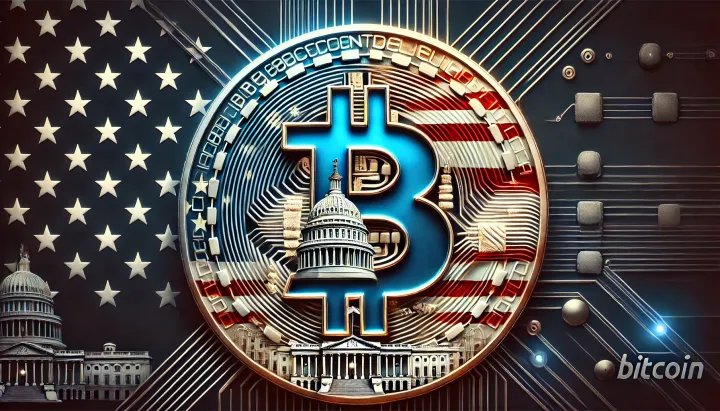States, Federal Ambitions, and the Coming Wave of Strategic Bitcoin Reserves
The December 10, 2024 episode of the McNallie Money podcast features Dennis Porter discussing a surge in policymaker interest in strategic Bitcoin reserves at both U.S. state and federal levels.

- My 'briefing notes' summarize the content of podcast episodes; they do not reflect my own views.
- They contain (1) a summary of podcast content, (2) potential information gaps, and (3) some speculative views on wider implications.
- Pay attention to broadcast dates (I often summarize older episodes)
- Some episodes I summarize may be sponsored: don't trust, verify, if the information you are looking for is to be used for decision-making.
Summary
The December 10, 2024 episode of the McNallie Money podcast features Dennis Porter, CEO and Co-Founder of Satoshi Action Fund, highlighting a surge in policymaker interest in strategic Bitcoin reserves at both U.S. state and federal levels. Lawmakers seek clear legal frameworks, inspired by successful state-level models and existing sound money policies. Emerging bipartisan alliances, global imitation of U.S. initiatives, and evolving market conditions suggest a pivotal moment for Bitcoin’s role in public treasuries and long-term financial planning.
Take-Home Messages
- Growing State-Level Momentum: Multiple U.S. states are moving swiftly toward adopting Bitcoin reserves, laying groundwork for long-term financial resilience.
- Federal Interest Emerges: While complex, federal strategies for Bitcoin reserves could align with evolving monetary policies.
- Bipartisan Potential: Lawmakers from diverse political backgrounds recognize Bitcoin’s strategic value, hinting at broader legislative convergence.
- Global Ripple Effects: Other nations may model their policies on U.S. strategies, reshaping the global reserve landscape.
- Local and Technological Gaps: Rural infrastructure and policy adaptability remain key challenges, demanding targeted solutions and robust legal frameworks.
Overview
Dennis Porter explains that U.S. states show unprecedented eagerness to integrate Bitcoin into their official reserves. This shift, he notes, stems partly from prior successes in enacting legislation that protects Bitcoin mining, self-custody, and node operations. As states gain confidence, some consider adopting strategic reserves similar to gold and silver holdings, guided by established sound money precedents.
He outlines that federal-level movement toward a strategic Bitcoin reserve remains complex, potentially requiring executive orders to jumpstart formal policy. Yet Porter emphasizes that notable shifts in the political climate, including the risk of electoral losses for anti-Bitcoin candidates, signal that broader alignment may be closer than once anticipated.
He describes the importance of carefully crafted policy models, referencing Satoshi Action Fund’s role in providing pre-tested frameworks and peer-reviewed research. These models help states implement stable, legally sound Bitcoin reserve programs while maintaining legislative momentum.
Across borders, rising interest in Bitcoin adoption mirrors U.S. developments. El Salvador’s ongoing experience, though still confronting infrastructure challenges, exemplifies how national Bitcoin policies can drive progress while demanding careful adjustment to local conditions. Porter suggests that as supply dynamics shift and global interest grows, the next cycle of Bitcoin adoption may surpass previous expectations.
Stakeholder Perspectives
- State Legislators: They see Bitcoin reserves as tools for fiscal innovation but require expert guidance to craft legally sound frameworks.
- Federal Policymakers: They remain cautious, balancing new digital asset strategies with existing monetary and fiscal policies.
- Investors and Market Analysts: They seek clarity on how official reserves might influence market behavior, pricing, and long-term investment patterns.
- Rural Communities: They welcome economic opportunities from Bitcoin adoption but need improved infrastructure and access to leverage its benefits.
Implications
Rising policymaker interest in Bitcoin suggests that states may soon treat this asset as a key financial instrument, diversifying away from traditional reserves. A clear, stable legal environment could emerge as states refine their frameworks, guiding other jurisdictions seeking similar models.
At scale, Bitcoin’s integration into official treasuries could influence global financial norms. By examining both the obstacles and enabling factors, policymakers may better understand how to harness Bitcoin’s long-term stability and adaptability, while also ensuring equitable outcomes and robust economic security.
Future Outlook
From Porter's perspective, federal and state policymakers who embrace strategic Bitcoin reserves early may gain a competitive edge. As domestic successes accumulate and bipartisan support strengthens, more legislators could frame Bitcoin as a cornerstone of future fiscal policy, harmonized with other sound money assets.
Looking ahead, sustained research, infrastructure development, and cross-sector collaboration will help refine best practices. Policymakers and industry leaders can strive toward solutions that integrate Bitcoin seamlessly, ensuring it supports diverse communities, meets policy goals, and anchors financial systems with greater resilience.
Information Gaps
- Legal Adaptability of State-Level Bitcoin Reserves: More research is needed on legislative structures ensuring policy durability over time, so state frameworks can adjust to Bitcoin’s evolving technology.
- Federal Integration into Fiscal Strategy: Understanding how Bitcoin reserves align with long-standing financial policies could illuminate paths for stable, long-term U.S. monetary stewardship.
- Global Standardization of Reserve Policies: Clarity on whether other nations will replicate U.S. models could foster coordinated international standards, ensuring stable global adoption.
- Improving Infrastructure in Emerging Markets: Investigating solutions for digital infrastructure in rural areas will ensure that economic benefits of Bitcoin extend beyond urban centers.
- Market Stability and Exchange Supply Dynamics: Evaluating how limited Bitcoin supply on exchanges might affect official reserve strategies can guide acquisition timing, price stability measures, and investor expectations.
Broader Implications for Bitcoin
Reshaping Fiscal Reserves
Integrating Bitcoin as a strategic reserve asset could redefine how nations manage long-term wealth. As governments adopt this digital asset, traditional reserve models might expand beyond gold or foreign currency, fostering more resilient fiscal policies. Such a shift would encourage global reserve diversification, providing new tools for economic stability.
Catalyzing Global Policy Harmonization
Widespread adoption of Bitcoin reserves may prompt international bodies to create common frameworks and standards. Coordinated policies could lower barriers for emerging markets and ensure uniformity in regulatory approaches. This global coherence may accelerate Bitcoin’s acceptance, reduce policy fragmentation, and strengthen market confidence.
Driving Technological Infrastructure Growth
As governments and states turn to Bitcoin reserves, investment in underlying infrastructure may increase. Improved digital connectivity, access to secure custody solutions, and enhanced payment networks would follow. This technological boost can bridge economic divides, empower local communities, and contribute to more inclusive financial ecosystems worldwide.



Comments ()